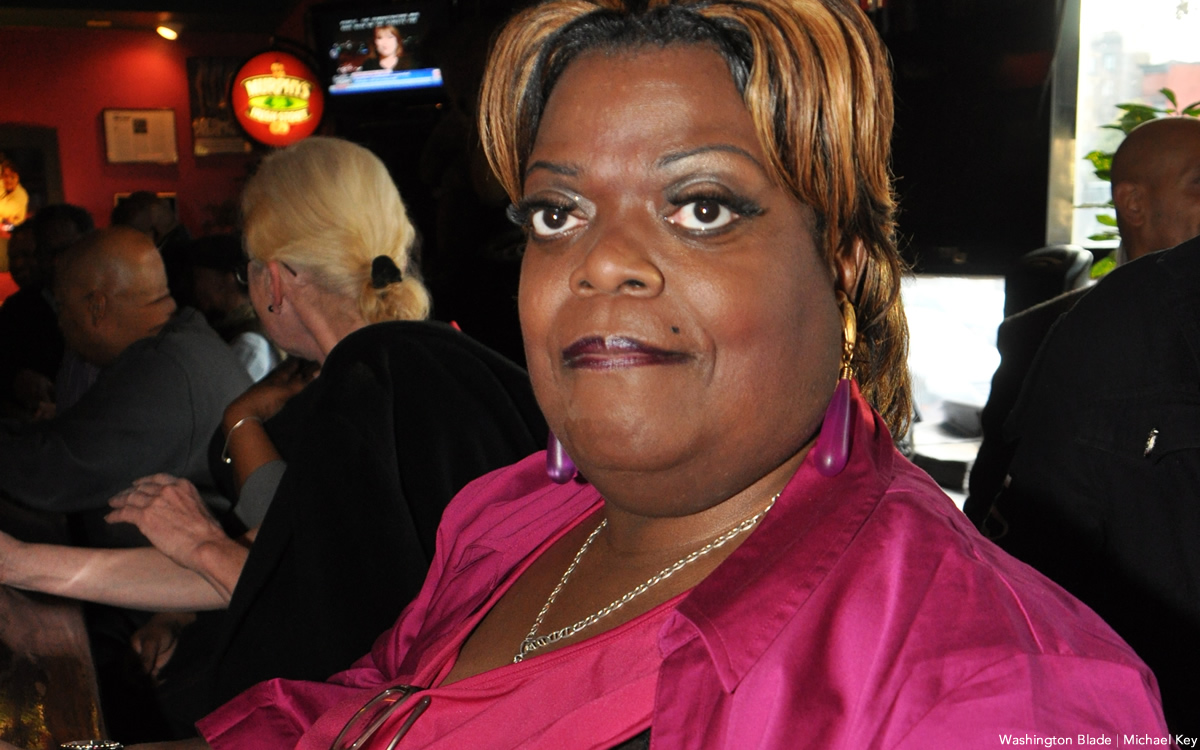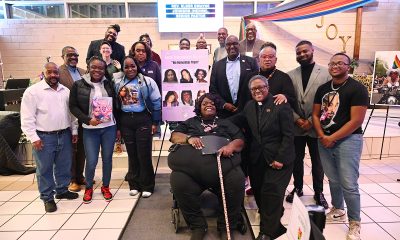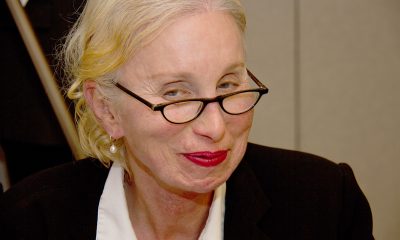District of Columbia
D.C. trans group suspends operation of LGBTQ crime victim housing facility
Says court officials failed to provide promised number of residents

The D.C.-based LGBTQ organization Empowering the Transgender Community, known as ETC, was forced to suspend its operation of a temporary emergency housing facility for LGBTQ victims of violent crime because the D.C. Superior Court did not provide enough tenants to financially sustain the facility, according to ETC founder and executive director Earline Budd.
Budd and Benita Nero, ETC’s director of programs, told the Washington Blade an official in charge of the Superior Court’s Crime Victims Compensation Program informed ETC in March of 2022 that she expected the court program to provide tenants needing emergency housing to fill the ETC facility to its capacity of 26 individuals or families.
“That never happened,” Nero said. She and Budd said the overhead expenses for renting the small apartment building and hiring staff to oversee its 14 apartments and a capacity of accommodating about 26 to 28 people caused ETC to go into debt because the reimbursement they received from the court for far fewer people than initially promised did not cover the expenses.
“We have had to suspend the program during the last four weeks because we couldn’t keep having staff work and not get paid and not being able to pay the landlord,” Budd said.
“We weren’t even getting 15 people a month,” Nero said. “Fifteen a month would have kept the doors open. They were giving us three people, six people” per month, she said, during most of the time the facility was operating from May through November.
Nero said on a few occasions, the court sent over families with five or six children but provided insufficient reimbursement for the cost of feeding the children and their adult parent, further adding to the debt ETC incurred under the program. The court also was sometimes a month or two late in making its payments for ETC’s housing services, according to Nero.
A description of the crime victims housing program on the Superior Court website in March 2022 said the program establishes arrangements with housing providers for crime victims who could be subjected to danger if they remain in the residence where they had been living at the time they became victims, usually of a crime of violence.
Many of the individuals admitted to the program are victims of domestic violence and need emergency housing, Budd said. She said some of the victims may also be victims of a hate crime.
Budd said ETC was hopeful that it could reopen the emergency housing facility under a revised memorandum of understanding with the Superior Court.
Douglas Buchanan, a spokesperson for the D.C. Superior Court, declined a request by the Blade for an official comment by the court system in response to the concerns raised by Budd and Nero that the court did not fulfill its original commitment to provide a larger number of residents for the ETC housing facility.
Patricia Hawkins, vice chair of the ETC Board of Directors, told the Blade a key factor that caused fewer people than initially promised to be sent to the ETC housing facility was a decision by court officials to reverse an earlier decision to stop sending crime victims needing emergency housing to local hotels. Hawkins said court officials informed ETC in early 2022 that they were discontinuing the hotel option for crime victims and expected to send far larger numbers of crime victim residents to the ETC facility.
Budd and Nero said staffing problems at ETC surfaced from what they say was a severe financial shortfall brought about when the court program did not provide sufficient tenants to pull in funds needed to keep up with the overhead expenses of renting the apartment building and paying the staff.
“I have the data to prove it,” said Nero, referring to the number of people the court program sent in as emergency tenants during the six months or so that the facility was open. “And I felt like if you open an entity, that means you needed it,” she said. “So, evidently you didn’t need it because we weren’t sent enough people to stay open. So, why would you approve an entity to open if you didn’t have the people to support it?”
Budd said an official with the D.C. Department of Human Services (DHS) has reached out to ETC about the possibility of using the ETC apartment building as a low barrier homeless shelter. She said the facility would not likely be able to be used as both a homeless shelter and a housing facility for the courts at the same time, requiring ETC to decide which of the two programs to pursue.
According to Nero, the financial shortfall caused by overhead costs far exceeding the reimbursement funds ETC received from the Superior Court’s Crime Victims Compensation Program resulted in a debt, including back rent, of close to $80,000. This has prompted Budd to launch a GoFundMe fundraising site seeking financial support from the community.

In an official statement released at the reveal event Capital Pride Alliance described its just announced 2026 Pride theme of “Exist, Resist, Have the Audacity” as a “bold declaration affirming the presence, resilience, and courage of LGBTQ+ people around the world.”
The statement adds, “Grounded in the undeniable truth that our existence is not up for debate, this year’s theme calls on the community to live loudly and proudly, stand firm against injustice and erasure, and embody the collective strength that has always defined the LGBTQ+ community.”
In a reference to the impact of the hostile political climate, the statement says, “In a time when LGBTQ+ rights and history continue to face challenges, especially in our Nation’s Capital, where policy and public discourse shape the future of our country, together, we must ensure that our voices are visible, heard, and unapologetically centered.”
The statement also quotes Capital Pride Alliance CEO and President Ryan Bos’s message at the Reveal event: “This year’s theme is both a declaration and a demand,” Bos said. “Exist, Resist, Have Audacity! reflects the resilience of our community and our responsibility to protect the progress we’ve made. As we look toward our nation’s 250th anniversary, we affirm that LGBTQ+ people have always been and always will be part of the United States’s history, and we will continue shaping its future with strength and resolve,” he concluded.
District of Columbia
Capital Pride board member resigns, alleges failure to address ‘sexual misconduct’
In startling letter, Taylor Chandler says board’s inaction protected ‘sexual predator’

Taylor Lianne Chandler, a member of the Capital Pride Alliance Board of Directors since 2019 who most recently served as the board’s secretary, submitted a letter of resignation on Feb. 24 that alleges the board has failed to address instances of “sexual misconduct” within the Capital Pride organization.
The Washington Blade received a copy of Chandler’s resignation letter one day after she submitted it from an anonymous source. Chandler, who identifies as transgender and intersex, said in an interview that she did not send the letter to the Blade, but she suspected someone associated with Capital Pride, which organizes D.C.’s annual LGBTQ Pride events, “wants it out in the open.”
“It is with a heavy heart, but with absolute clarity, that I submit my resignation from the Capital Pride Alliance Board of Directors effective immediately,” Chandler states in her letter. “I have devoted nearly ten years of my life to this organization,” she wrote, pointing to her initial involvement as a volunteer and later as a producer of events as chair of the organization’s Transgender, Gender Non-Conforming, and Intersex Committee.
“Capital Pride once meant something profound to me – a space of safety, visibility, and community for people who have often been denied all three,” her letter continues. “That is no longer the organization I am part of today.”
“I, along with other board members, brought forward credible concerns regarding sexual misconduct – a pattern of behavior spanning years – to the attention of this board,” Chandler states in the letter. “What followed was not accountability. What followed was retaliation. Rather than addressing the substance of what was reported, officers and fellow board members chose to chastise those of us who came forward.”
The letter adds, “This board has made its priorities clear through its actions: protecting a sexual predator matters more than protecting the people who had the courage to come forward. … I have been targeted, bullied, and made to feel like an outsider for doing what any person of integrity would do – telling the truth.”
In response to a request from the Blade for comment, Anna Jinkerson, who serves as chair of the Capital Pride board, sent the Blade a statement praising Taylor Chandler’s efforts as a Capital Pride volunteer and board member but did not specifically address the issue of alleged sexual misconduct.
“We’re also aware that her resignation letter has been shared with the media and has listed concerns,” Jinkerson said in her statement. “When concerns are brought to CPA, we act quickly and appropriately to address them,” she said.
“As we continue to grow our organization, we’re proactively strengthening the policies and procedures that shape our systems, our infrastructure, and the support we provide to our team and partners,” Jinkerson said in her statement. “We’re doing this because the community’s experience with CPA must always be safe, affirming, empowering, and inclusive,” she added.
In an interview with the Blade, Chandler said she was not the target of the alleged sexual harassment.
She said a Capital Pride investigation identified one individual implicated in a “pattern” of sexual harassment related behavior over a period of time. But she said she was bound by a Non-Disclosure Agreement (NDA) that applies to all board members and she cannot disclose the name of the person implicated in alleged sexual misconduct or those who came forward to complain about it.
“It was one individual, but there was a pattern and a history,” Chandler said, noting that was the extent of what she can disclose.
“And I’ll say this,” she added. “In my opinion, with gay culture sometimes the touchy feely-ness that goes on seems to be like just part of the culture, not necessarily the same as a sexual assault or whatever. But at the same time, if someone does not want those advances and they’re saying no and trying to push you away and trying to avoid you, then it makes it that way regardless of the culture.”
When asked about when the allegations of sexual harassment first surfaced, Chandler said, “In the past year is when the allegation came forward from one individual. But in the course of this all happening, other individuals came forward and talked about instances – several which showed a pattern.”
Chandler’s resignation comes about five months after Capital Pride Alliance announced in a statement released in October 2025 that its then board president, Ashley Smith, resigned from his position on Oct. 18 after Capital Pride became aware of a “claim” regarding Smith. The statement said the group retained an independent firm to investigate the matter, but it released no further details since that time. Smith has declined to comment on the matter.
When asked by the Blade if the Smith resignation could be linked in some way to allegations of sexual misconduct, Chandler said, “I can’t make a comment one way or the other on that.”
Chandler’s resignation and allegations come after Capital Pride Alliance has been credited with playing the lead role in organizing the World Pride celebration hosted by D.C. in which dozens of LGBTQ-related Pride events were held from May through June of 2025.
The letter of resignation also came just days before Capital Pride Alliance’s annual “Reveal” event scheduled for Feb. 26 at the Hamilton Hotel in which the theme for D.C.’s June 2026 LGBTQ Pride events was to be announced along with other Pride plans.
District of Columbia
Capital Stonewall Democrats elect new leaders
LGBTQ political group set to celebrate 50th anniversary

Longtime Democratic Party activists Stevie McCarty and Brad Howard won election last week as president and vice president for administration for the Capital Stonewall Democrats, D.C.’s largest local LGBTQ political organization.
In a Feb. 24 announcement, the group said McCarty and Howard, both of whom are elected DC Advisory Neighborhood Commissioners, ran in a special Capital Stonewall Democrats election to fill the two leadership positions that became vacant when the officers they replaced resigned.
Outgoing President Howard Garrett, who McCarty has replaced, told the Washington Blade he resigned after taking on a new position as chair of the city’s Ward 1 Democratic Committee. The Capital Stonewall Democrats announcement didn’t say who Howard replaced as vice president for administration.
The group’s website shows its other officers include Elizabeth Mitchell as Vice President for Legislative and Political Affairs, and Monica Nemeth as Treasurer. The officer position of secretary is vacant, the website shows.
“As we look toward 2026, the stakes for D.C. and for LGBTQ+ communities have never been clearer,” the group’s statement announcing McCarty and Howard’s election says. “Our 50th anniversary celebration on March 20 and the launch of our D.C. LGBTQ+ Voter’s Guide mark the beginning of a major year for endorsements, organizing, and coalition building,” the statement says.
McCarty said among the organization’s major endeavors will be holding virtual endorsement forums where candidates running for D.C. mayor and the Council will appear and seek the group’s endorsement.
Founded in 1976 as the Gertrude Stein Democratic Club, the organization’s members voted in 2021 to change its name to Capital Stonewall Democrats. McCarty said the 50th anniversary celebration on March 20, in which D.C. Mayor Muriel Bowser and members of the D.C. Council are expected to attend, will be held at the PEPCO Gallery meeting center at 702 8th St., N.W.




















